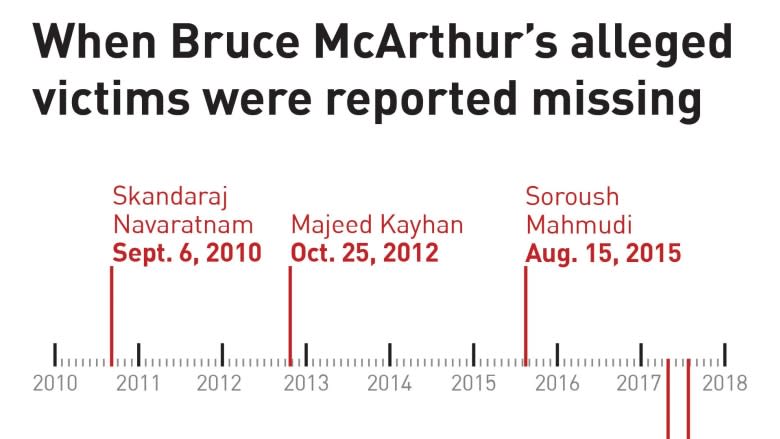Bruce McArthur charged with 1st-degree murder in Skandaraj Navaratnam's death
Alleged serial killer Bruce McArthur is now facing a sixth charge of first-degree murder, this time in the death of Skandaraj Navaratnam, whose remains were found in a planter seized from a property linked to the landscaper.
Det.-Sgt. Hank Idsinga announced the latest charge at a news conference Friday.
Shortly after the news conference, McArthur appeared in a Toronto court via video link. He will return to court on Feb. 28.
The 40-year-old Navaratnam was known to friends as Skanda. He was last seen leaving a Toronto nightclub on Sept. 6, 2010. A friend reported him missing 10 days later. Navaratnam was later one of three men included in a Toronto police task force called Project Houston, which looked at the disappearances of men from the area around the city's Gay Village between 2010 and 2012.
While Idsinga would not confirm if or how Navaratnam and McArthur knew each other, a friend previously told CBC Toronto that the two had a romantic history dating back to the early 2000s.
McArthur and Navaratnam were listed as friends on Facebook before McArthur's profile was pulled down.
Idsinga said Navaratnam's remains were found in one of the five planters police recovered from a midtown Toronto home on Mallory Crescent that's been a focus of their investigation into McArthur.
Jean-Guy Cloutier, who reported Navaratnam missing, said after eight years of unanswered questions he is "very relieved" to know what happened.
"I was also in shock and really angry to know that my best friend was killed in such a way and then just disposed inhumanly," he told CBC Toronto.
"Just to think that a human being could do that to another and others is just shocking to me."
Now Cloutier hopes "even though the outcome is so horrific that he didn't have to suffer," he said of Navaratnam's death.
Idsinga also said another set of remains found in a planter from the property has been identified: those of Soroush Mahmudi, 50. McArthur is already charged in Mahmudi's death.
McArthur was previously charged with five counts of first-degree murder in the cases of Andrew Kinsman, 49, Selim Esen, 44, Majeed Kayhan, 58, Dean Lisowick, 47, and Mahmudi.
Since McArthur's Jan. 18 arrest, Toronto police have been combing properties where the 66-year-old landscaper worked.
Police recovered the remains of at least six people, including those of Kinsman, hidden in five large planters at the Mallory Crescent residence where McArthur stored equipment for 10 years in exchange for landscaping work.
The remains of three other people have not yet been identified. Idsinga said Friday there are a handful of ways to identify remains, each of which takes a different amount of time. Fingerprints and dental records are relatively quick methods, he said. A DNA analysis can take much longer, in some cases months, he said.
Investigators spent three weeks camped out at the Mallory Crescent home and even dug up the main drainpipe in front of the property looking for potential evidence. A portion of pipe was removed for testing. Police have wrapped their investigation at that property for now, but Idsinga said Friday investigators will return when the weather is warmer to let police dogs have another look around.
As he has said before, Idsinga reiterated his belief that more charges will be laid against McArthur. He also suggested the investigation could stretch into several months, or even years depending "on what we find and where the investigation takes us."
He noted that police have gone through "upwards of 20" planters seized from various properties, and are still searching "several" other properties, including two or three "we are particularly interested in."
Asked where the alleged murders occurred, Idsinga would not provide a specific answer, saying only: "We do believe we have multiple murder scenes."
As part of the investigation, police are looking into "multiple outstanding murder cases," as well as "hundreds" of outstanding missing persons cases, Idsinga said. He had previously said the outstanding cases go back decades.
He also revealed Friday that investigators are also looking at "sudden death" cases, but did not get into specifics.
He noted that there's been a "surge" of missing persons cases since the McArthur investigation broke.
Asked about the sustainability of a years-long investigation, Idsinga said it "depends on what we find."
"As long as we're finding things, it's not getting pared down. It will get expanded. Whatever I've asked for, I've received. Manpower is not an issue."
Idsinga, a veteran police officer, called the McArthur case "unique," even for seasoned investigators like himself and members of his team.
"We've been doing this for a long time. I'm not going to say we're used to seeing things like this. It's completely different," he said. "We'll get through it. I admit it's very tiring. It's very disturbing."




